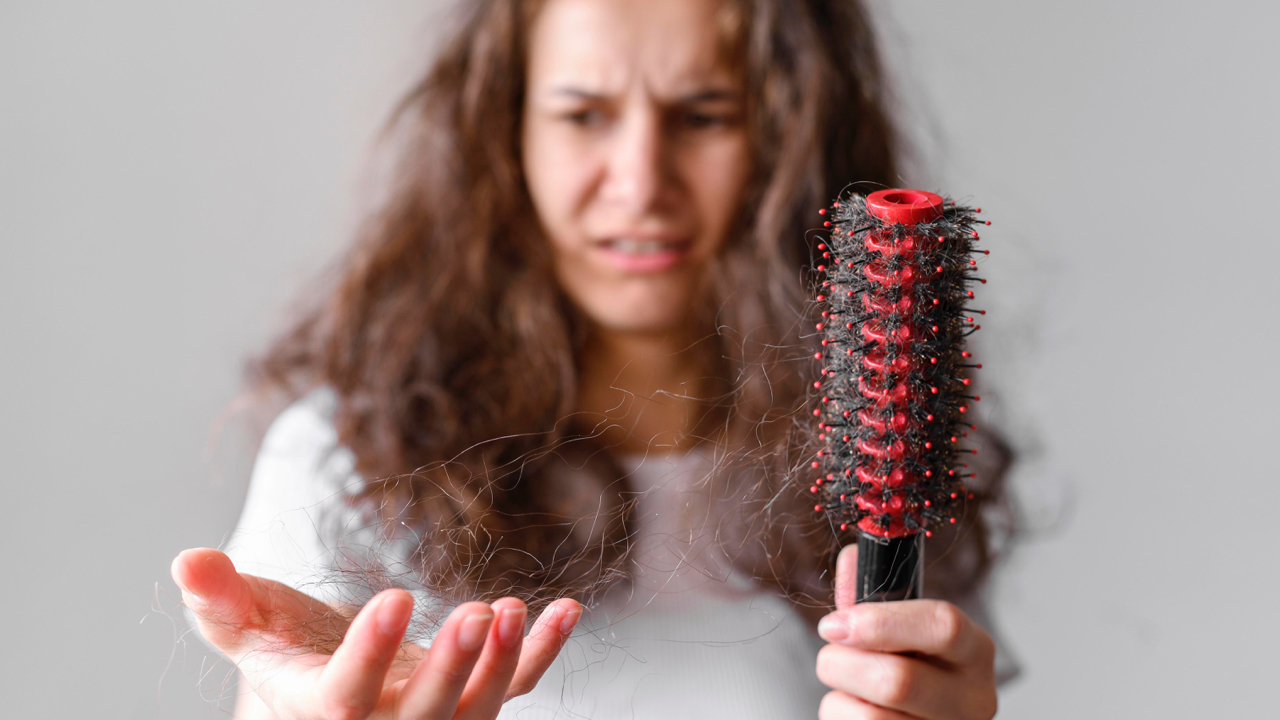Healthy Hair After Baby!
Jul 06, 2023
So your new bundle of joy is finally here! You are slowly adjusting to your new normal and trying to get both you and the baby into a routine. You may even be heading back to work shortly after a maternity leave. Life seems to be getting into a groove when...BOOM...all of a sudden your hair starts to fall out! And we're not talking about just a few strands, this is clumps and clumps of hair in the shower, in your brush, with even a slight pull on your hair! YIKES you think as you worry that complete baldness may be in your future!
But fear not, this hair shedding is completely NORMAL! Yes, believe it or not, hair loss after a baby is actually quite common and known as telogen effluvium. On a recent blog and podcast I discussed postpartum skin and hair changes so let's take a deeper dive into postpartum hair shedding.
Telogen Effluvium
The hair cycle is composed of 3 stages: anagen (the growth phase), catagen (the resting phase) and telogen (the shedding stage). Our hair cycles through these 3 stages throughout our lives and the length of your anagen phase is what determines your hair length. During pregnancy, the elevation of estrogen and progesterone push more hairs into the anagen phase giving mothers-to-be that gorgeous, thick enviable hair! However, after delivery, estrogen and progesterone levels plummet which switches the hairs into telogen or the shedding phase. This is why it seems like all your hair is falling out at once! The good news is that this hair loss is normal, reversible, and non-scarring. You will get your hair back as your hair cycle switches back into anagen.
Telogen effluvium doesn't just happen after pregnancy, any big stressor like an illness (COVID) or surgery can cause this. Typically it's seen 3-6 months after the stressor which is why it's sometimes hard to associate it to a prior event. The tell-tale sign of telogen effluvium is copious amounts of hair shedding. This is in contrast to hormonal hair loss (androgenetic hair loss) where people just look in the mirror and see more scalp showing and widening of their part without noticing hairs falling out.
When to see your dermatologist?
While telogen effluvium is normal, you may want to see your dermatologist if you have concerns about the hair shedding lasting more than a few months or if you are not seeing the hair regrowth occurring.
A dermatologist can provide a professional evaluation, diagnose the condition, and offer guidance on potential treatment options.
At-home Treatment Options
While you do not necessarily have to treat telogen effluvium, there are ways to speed up the hair regrowth.
Minoxidil 5% foam (commonly known as Rogaine) This works by increasing oxygen and blood flow to the hair follicles. Apply the foam directly to the scalp daily. You have to stick with this for several months to see the benefits so buy in bulk. Applying a retinoid first and then the minoxidil has shown increased efficacy.
Hair Supplements
While biotin has been debunked as a supplement for hair growth, other ingredients have shown promise in hair regrowth including saw palmetto, ashwagandha, omega three fatty acids, keratin, collagen and others. A daily supplement after delivery may help improve hair regrowth for patients.
But wait, there's more...while easier said than done, a balanced diet and plenty of sleep will also help with stress relief and hair regrowth!
In-Office Procedures
For those looking to speed up hair regrowth even further, consider in-office procedures like platelet rich plasma (PRP) with your dermatologist. Your dermatologist will draw your blood then spin it down in a centrifuge to separate out the plasma which is chocked full of platelets which have powerful growth factors! This can be beneficial for hair loss from hormonal (female and male pattern baldness) as well as with telogen effluvium!
Lastly, when should you just say to heck with it all and get the 'mom cut?!'
After giving birth, many new moms opt for a haircut when they experience postpartum hair shedding. A fresh hairstyle can give you a renewed look for this new chapter of your life and help minimize the visibility of your hair loss.
Life after pregnancy is an exciting and messy time. Hair shedding can be stressful, but new moms should rest assured that this is normal and reversible. Be sure to take time for yourself during the 4th trimester of pregnancy and seek care from your dermatologist if your hair loss is stressing you out!
Tune in to this week’s podcast episode with Dr. Mislankar where we’ll be sharing insights and tips on managing hair loss after pregnancy.
A new podcast episode drops every Monday!






